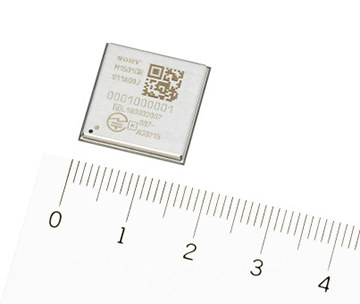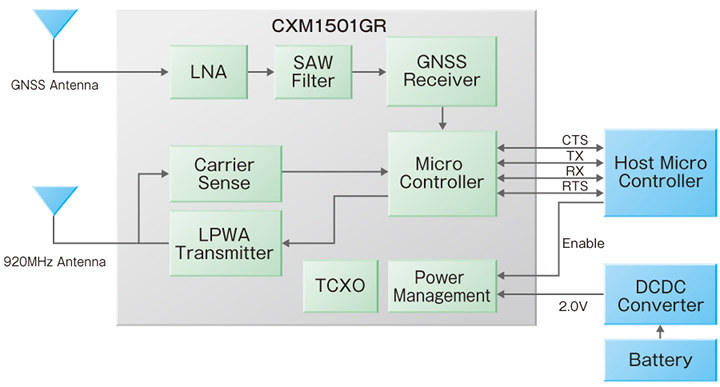 While there are many LPWAN (Low Power Wide Area Network) standards, three appear to dominate the news namely LoRaWAN, SigFox, and 3GPP NB-IoT/eMTC. They all offer long range and up to 10-year of battery life enabled by the use of low bitrate which is fast enough to send sensor data.
While there are many LPWAN (Low Power Wide Area Network) standards, three appear to dominate the news namely LoRaWAN, SigFox, and 3GPP NB-IoT/eMTC. They all offer long range and up to 10-year of battery life enabled by the use of low bitrate which is fast enough to send sensor data.
We can now add another LWPAN standard to the list, as Sony has developed ELTRES wireless communication standard suitable for IoT networks, and announced their CXM1501GR ELTRES module with a range of over 100km, even while traveling at 100km/h.
Key features and specifications:
- ELTRES Connectivity
- Antenna radiated power – 20mW
- Communication direction – Uplink only
- Frequency – 923.6 MHz to 928.0 MHz (23-channel frequency hopping)
- Main modulation system – π/2 Shift BPSK
- Sub-modulation system – Linear chirp modulation
- Transmission system – Four repeated transmissions of 0.4 sec or shorter packets
- Reduction of interference with other systems – CSMA (Carrier Sense Multiple Access)
- Error correction code – LDPC (Low Density Parity Check) code
- Effective rate – Number of transmission bits / total transmission time
80 bps (Channel rate: 6.35 kbps) - Reception sensitivity – -142dBm
- GNSS – High-sensitivity, low-power GNSS LSI for compatibility with GPS, GLONASS, and QZSS
- Host Interface – UART
- Security function – Included
- Voltage – 2.0V
- Dimensions – 16 x 16 x 2.0 mm
- Package – 65-pin LGA (0.5mm pitch)
- Certification – Radio Act of Japan (007-AG0043)
 Some quick remarks. ELTRES is basically using the same frequency bands as LoRa radios, and it is uplink only, meaning ELTRES nodes can send data, but cannot be controlled remotely. Although we know it’s supposed to run on a coin cell battery, Sony has not provided any power consumption numbers for the module. ELTRES IoT network service will first be deployed in Japan starting this autumn with the eventual goal of providing national coverage. It’s unclear whether ELTRES will make it outside of Japan.
Some quick remarks. ELTRES is basically using the same frequency bands as LoRa radios, and it is uplink only, meaning ELTRES nodes can send data, but cannot be controlled remotely. Although we know it’s supposed to run on a coin cell battery, Sony has not provided any power consumption numbers for the module. ELTRES IoT network service will first be deployed in Japan starting this autumn with the eventual goal of providing national coverage. It’s unclear whether ELTRES will make it outside of Japan.
ELTRES wireless standard can be used for all sort of monitoring & tracking applications including bicycle rentals, landslides reports, yacht race tracking, location monitoring of drones and so on.
More details can be found in the module page, as well as ELTRES’ official website.

Jean-Luc started CNX Software in 2010 as a part-time endeavor, before quitting his job as a software engineering manager, and starting to write daily news, and reviews full time later in 2011.
Support CNX Software! Donate via cryptocurrencies, become a Patron on Patreon, or purchase goods on Amazon or Aliexpress





I don’t think this will ever be available outside of Japan: – It’s not an open system like LoRaWAN where you can get a gateway and run your own network – You have to be registered with Sony at one of the different tiers to get access to anything – Sony and friends are rolling out the network and they hope to have it nation wide in Japan by 2020 Soracom (a company that sells lorawan gateways, iot sims etc to normal people in Japan) seems to be involved though so maybe there will be some sort of maker targeted… Read more »
How does this compare with the thingsnetwork record?
” The Things Network. One of the gateways reached during the fight is located in Wrocław, Poland. By then, the balloon was flying over Osterwald in Germany, just across the German border from The Netherlands. A distance of 702.676km was reached by using only 25mW (14dBm) of transmitting power, roughly 40 times smaller than a mobile phone can use. Find it hard to believe? Have a look at the results and raw data (with 498 data points in total). “
Well, this starts to look like a race to the longest distance without any relay, which sounds appealing at first… until you remember that the earth is not flat! In order to have a clear 100km line of sight, you must be at ~800m altitude! For most use cases it’s useless. I’d say that anything beyond 10km becomes very specific to the application : you already need 10m for 10km, and that’s not even counting the potential presence of buildings or trees. With all this in mind, for the vast majority of applications it’s probably better to focus on reliability… Read more »
LoRaWan benefits from many repeaters; maybe these are not abundant present in Japan? Give the geographical circumstances, I doubt 100KM is anything near realistic…
The frequency band prohibits use world wide: Europe uses 868, the Americas use 904/925Mhz, and China 486MHz. The indicated band is used in Japan, Malaysia, Singapore and Indonesia.
See: https://www.thethingsnetwork.org/docs/lorawan/frequency-plans.html
>maybe these are not abundant present in Japan?
There are some commercial gateway rollouts but they are not public AFAIK. There are a few people running TTN gateways and I suspect most of those will be of grey legality because getting a gateway with the right radio approvals isn’t easy/cheap.
Considering how good the mobile network is here, I can go into the mountains and still watch youtube, for most things IoT sims make more sense. The target market for this is going to by putting a tracker into your kid’s $600 school back pack so you can find them.
“While there are many LPWAN (Low Power Wide Area Network) standards, three appear to dominate the news namely LoRaWAN, SigFox, and 3GPP NB-IoT/eMTC.” Arguably Ingenu’s RPMA – Random Polarization Multiple Access – has good take-up, at least commercially. See here: https://www.ingenu.com/get-started/partners/ SigFox, Ingenu’s RPMA, and now Sony’s ELTRES suffer from a subscription-based “Partner” lock-in model. 3GPP NB-IoT/eMTC (LTE Cat-M1) adopts the underlying cellular-carrier subscription-based model which is (unsurprisingly) overpriced (at least in the U.S.) Of all the LPWAN schemes only Semtech’s LoRa/LoRaWAN is readily accessible, self deployable, very affordable, and subscription free , but only at very small scales. At… Read more »